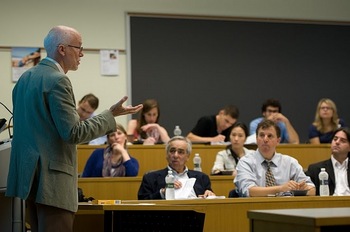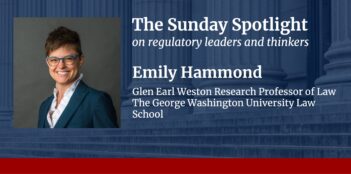
Penn Program on Regulation hosts leading scholars of risk regulation.
The Penn Program on Regulation’s risk regulation seminar series showcased leading research on risk and uncertainty during the University of Pennsylvania’s fall 2011 academic term.
Leading off in September, Geoffrey M. Heal of Columbia Business School on presented the paper, Ambiguity and Climate Policy, which he coauthored with Simon Dietz of London School of Economics and Antony Millner of University of California Berkeley. Heal showed that competing models of the effects of climate change create a degree of uncertainty that makes it inappropriate to rely on traditional policy evaluation, based on a single probability estimates of expected utility. Heal proposed a new model for evaluating climate change policy that takes into account policymakers’ aversion to ambiguity and which may increase the value of abating greenhouse gas emissions.
In October, Yale law Professor Daniel Kahan presented his co-authored study, The Tragedy of the Risk-Perception Commons: Culture Conflict, Rationality Conflict, and Climate Change. His research drew into question the popular belief that scientific illiteracy causes public opinion to differ from scientific consensus on climate change. His research showed that culture influenced expectations on climate change much more than levels of scientific literacy. In fact, opinions diverged more among the scientifically literate, suggesting that individuals interpret information in order to remain consistent with their cultural predisposition toward risk. Kahan recommended that scientific communication focus on presenting information in a manner that affirms cultural values.
In the concluding fall seminar, held in November, PPR’s executive director, Adam Finkel, presented his paper Out of Balance: How Uncertainty Figures in Risk Assessment and Regulatory Economics. He argued that economists do not account for uncertainty in their cost calculations to the same degree that risk scientists take uncertainty into account in estimating the beneficial effects of risk mitigation efforts. Finkel urged that uncertainty needs to be fully analyzed on both sides of the benefit-cost ledger, and also discussed why an asymmetry in the treatment of uncertainty has developed in analyses of risk regulation.
PPR recently announced its spring 2012 seminars, which will feature research by Steven L. Schwarcz, Stanley A. Star Professor of Law and Business, Duke University (January 24), Michael Greenstone, 3M Professor of Environmental Economics, Massachusetts Institute of Technology (February 21), and Paul Joskow, President, Alfred P. Sloan Foundation, and Elizabeth and James Killian Professor of Economics, Emeritus, Massachusetts Institute of Technology (March 27).
The Risk Regulation Seminar Series is jointly sponsored by the Penn Program on Regulation, the Wharton Risk Management & Decision Processes Center, and the University of Pennsylvania’s Initiative for Global Environmental Leadership.
For complete information about PPR’s risk regulation seminar series, please visit the program’s website.



